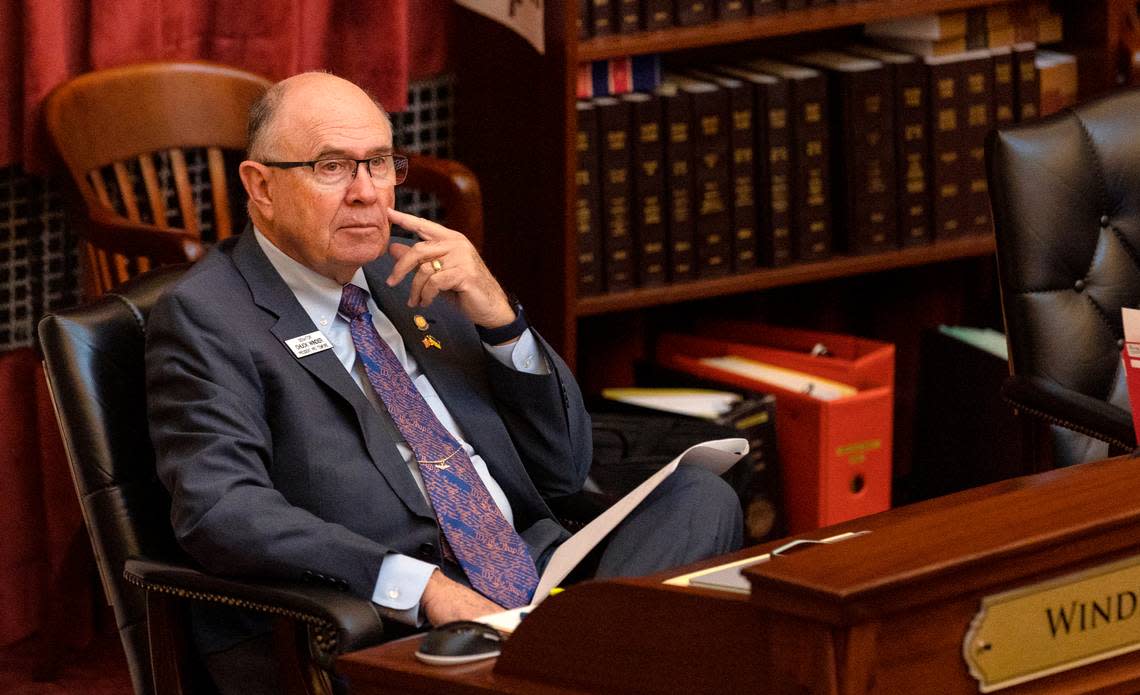Winder’s defeat a signpost on Idaho’s political path, which continues to turn right | Opinion

- Oops!Something went wrong.Please try again later.
- Oops!Something went wrong.Please try again later.
The far right gained ground in Tuesday night’s Republican primary election.
The most significant event of the night was the defeat of Senate Pro Tem Chuck Winder, R-Boise, by a primary challenge from Josh Keyser, who ran sharply to his right. The Senate, once seen as the more restrained and tradition-bound chamber of the Legislature, has not lost its leader this way in decades, if ever.
With Winder’s leadership goes one of the last tethers to a long tradition of careful, more practical leadership in the senior chamber.
Winder’s loss was just part of a broader shift in the composition of the Senate, which had already begun to shift sharply rightward over the past two election cycles. Sen. Linda Hartgen, R-Twin Falls, one of the most moderate members, was defeated by Josh Kohl, who promises a much more extreme approach.
Moderates did secure a key victory in North Idaho, with former Sen. Jim Woodward, R-Sagle, returning to defeat Sen. Scott Herndon, R-Sagle.
But on balance, the night’s races add up to a significant rightward shift. The median Republican senator is likely to be somewhere to the right of Sen. Lori Den Hartog, who not so long ago was one of the most conservative in the Senate.
Even if Democrats keep all their current seats in the general election, the ideological center of the Senate will nonetheless shift sharply to the right.
The House likewise shifted rightward.
Far-right primary challenger Kent Marmon decisively beat House Education Committee Chair Julie Yamamoto, R-Caldwell. Yamamoto’s defeat of Rep. Jarom Wagoner was hailed as a victory by that same faction just four years ago.
The median lawmaker in the Republican faction used to be someone about like House Speaker Mike Moyle, R-Star. After Tuesday, it’s likely to be someone more like Rep. Ted Hill, R-Eagle — assuming Democrats lose no seats in the general election.
The far right gained seats in both western and southern Idaho, making particular inroads in the Magic Valley, which had previously remained a steadfast haven for more moderate Republicans. Rep. Megan Blanksma, R-Hammett, who started the year as House majority leader before she was ousted from that post during the legislative session, lost to a challenger running to the right. Rep. Greg Lanting likewise lost to a right-wing primary challenger.
The far right’s grip on seats in the Panhandle remains firm, despite Herndon’s ouster after just one term, while moderates largely held incumbent seats and made significant gains in the eastern part of the state. Incumbents beat back far-right challengers handily, and it appears that moderate Ben Fuhriman ousted Rep. Julianne Young, R-Blackfoot, a key figure in the far-right caucus.
That was mirrored in efforts to contest the leadership of county GOP central committees in Bonneville and Kootenai counties, two important centers of power for the far-right faction.
In North Idaho, results were fairly mixed, with candidates who had organized to oust the far right losing more races than they won. But in Eastern Idaho, moderates on the whole did very well in precinct elections, including defeating the central committee chair. Moderates stand to have an overwhelming majority on what used to be a far-right Bonneville GOP Central Committee, centered around Idaho Falls.
Bryan Clark is an opinion writer for the Idaho Statesman.

